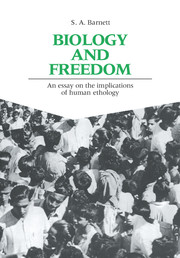Book contents
Part 4 - Homo operans: the greedy species
Published online by Cambridge University Press: 04 August 2010
Summary
What is a man,
If his chief good and market of his time
Be but to sleep and feed? A beast, no more.
Shakespeare: HamletThe self portraits derived from Darwinism reduce us to automata. An alternative movement, associated with the name of Pavlov, reduces our intelligence to mechanical ‘conditioning’. An influential successor to ‘Pavlovism’ explains all human action by the effects of rewards and punishments. These images pay attention only to behavior: feelings and even thoughts are excluded. They owe their impact partly to being based on experimental findings. Experiments have shown how we can regulate some of the activities of laboratory mammals in cages. Similar methods have been recommended for controlling human beings.
Problems that behaviorists have tried to solve include mental illness, the treatment of criminals, the education of children, the management of employed persons, and the design of an ideal society. But all attempts at such behavioral engineering have eventually had to face the complexities of human beings as persons: we have not only ‘senses, affections, passions’ with which behavioral engineering cannot cope, but also the ability (however imperfectly developed) to reach conclusions by independent investigation and reasoned argument.
To be useful, the results of experiments have to be combined with our commonsense, everyday knowledge of ourselves and of our history. When this is done, experimental studies can enlarge our understanding of ourselves in our social lives and in our work and play.
- Type
- Chapter
- Information
- Biology and FreedomAn Essay on the Implications of Human Ethology, pp. 173 - 176Publisher: Cambridge University PressPrint publication year: 1989



